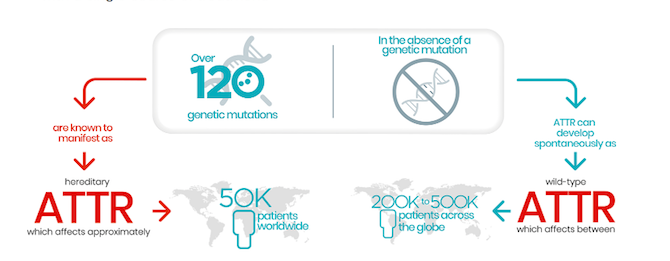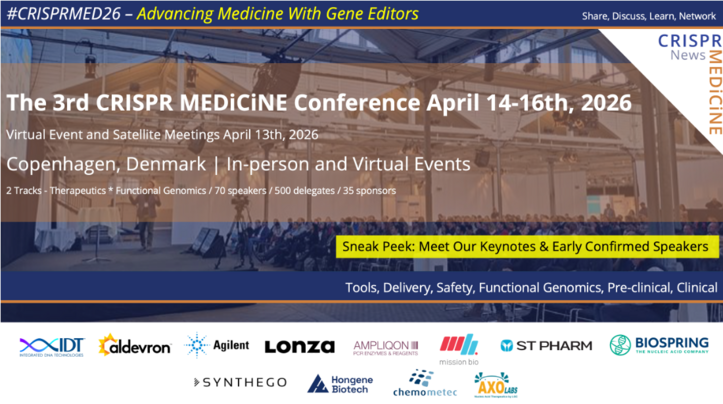CRISPR-Cas Clinical Trial Update
New clinical trials within gene editing are popping up all the time. This update includes 4 recently initiated trials, all using CRISPR-Cas technology to treat diseases including herpes simplex virus refractory keratitis, sickle cell disease, hereditary transthyretin amyloidosis or thalassemia genetic disease. In these trials, CRISPR-Cas is either used directly to treat the condition by editing an individual's genome in vivo or indirectly through ex vivo engineering of a cell-based therapy.
CRISPR-Cas mRNA Trial for Herpes Simplex Virus Refractory Keratitis
Herpes simplex virus keratitis, also known as herpetic viral keratitis, is an inflammatory disorder of the cornea that occurs as a result of infection with the herpes simplex virus (HSV). Many cases heal by themselves over time, but severe cases may occur that can lead to corneal scarring or even blindness. HSV is a major cause of blindness worldwide, and most infections are caused by the HSV-1 subtype. Treatments include eye drops and antiviral drugs and while most cases are treatable, there is no cure.
A new Phase 1/2 open-label, single ascending dose study led byShanghai BD Gene Therapeuticsand the Eye & ENT Hospital of Fudan University, both in China, aims to evaluate the safety and efficacy of BD111, a novel gene-editing therapy that is designed to clear HSV-1 infection. BD111 is developed with BD Gene Therapeutics’ viroid BDmRNA delivery technology that permits transient expression of CRISPR-Cas and gRNA molecules to target HSV-1. The therapy is being developed as a one-time curative treatment for herpetic viral keratitis.
The trial will involve 6 adult participants who will each receive a single dose of the treatment via corneal injection surgery. There are no comparative treatments on the market, so efficacy assessments will be made by pre- and post-treatment comparisons. The total follow up period period is 360 days, but participants will be monitored at regular intervals throughout this period. The estimated study completion date is 2022.
CRISPR-Cas9 Trial For NTLA-2001 to Treat Hereditary Transthyretin Amyloidosis With Polyneuropathy
The second newly-added trial is sponsored by US-based Intellia Therapeutics and seeks to enroll 38 participants who are diagnosed with polyneuropathy (PN) due to transthyretin (TTR) amyloidosis (ATTR).
This open-label Phase 1 two-part trial comprises a dose escalation followed by a safety dose expansion study to evaluate the safety, tolerability, pharmacokinetics and pharmacodynamics of Intellia’s most advanced in vivo CRISPR-based therapy candidate, NTLA-2001.
ATTR is a hereditary progressive condition that is characterised by an accumulation of misfolded transthyretin (TTR) protein. The disease results from mutation(s) in the TTR gene, leading to mutant TRR protein that is unstable and easily forms aggregates that deposit as amyloid in various organs and tissues in the body. Organs or body parts most often affected include the nerves, heart, kidneys and eyes.
Life expectancy is typically 2-15 years from disease onset, and current treatment options include transplantation of affected organs and medications to slow progression of disease symptoms.
NTLA-2001 is the first investigative CRISPR-based therapy to be administered in vivo in humans. The new therapy comprises TTR-targeting gRNA and Cas9 mRNA, both of which are delivered in vivo via Intellia’s proprietary lipid nanoparticle technology. Pre-clinical studies support the notion that NTLA-2001 has potential as a one-time curative treatment. The first patient was dosed with NTLA-2001 last week and the study is expected to be complete in 2024.

Phase 1/2 Clinical Trial for CRISPR-based Stem Cell Therapy for Sickle Cell Disease
Sickle cell disease is a group of blood disorders that affect haemoglobin, and the hallmark of these disorders is sickle- or cresent-shaped red blood cells that die prematurely, leading to a shortage of red blood cells that causes serious problems including infection, acute chest syndrome and stroke.
Switzerland-based Novartis Pharmaceuticals recently initiated an open label, non-randomised, first-in-patient, phase 1/2, proof-of-concept study to follow patients for two years after transplantation of one of two ex vivo CRISPR-edited autologous haematopoietic stem and progenitor cell experimental therapies.
The experimental therapies are OTQ923 and HIX763, both of which are designed to reduce the biologic activity of the B-cell lymphoma/leukaemia 11A protein (BCL11A), increasing fetal haemoglobin (HbF) and reducing complications of sickle cell disease. BCL11A is a major modulator of haemoglobin switching and it suppresses the production of fetal haemoglobin. Inhibition of BCL11A has been extensively explored as a therapeutic strategy to raise fetal haemoglobin levels in individuals that have sickle cell disease, to compensate for defective haemoglobin function.
A similar strategy in a competing trial released the first remarkable and promising data earlier this year.
The study will be split into distinct sections that will individually assess the candidate therapies in adults and children. OTQ923 and HIX763 are CRISPR-edited haematopoietic stem cells that are developed using CRISPR/Cas9 RNA guides identified through collaboration between Novartis and Intellia Therapeutics. The trial is currently in the recruitment stage for a total of 20 participants and the expected completion date is in November 2023.
CRISPR-Cas9-Edited Induced Haematopoietic Stem Cells to Treat Beta Thalassemia
Allife Medical Science and Technology, China is sponsoring an ongoing Phase 1 trial to evaluate the safety and efficacy of a CRISPR-Cas9-edited induced haematopoietic stem cell (iHSC) therapy to treat the blood disorder beta thalassemia. The study was initated in 2019 with 12 patients between the ages of 2 and 60 years old.
Beta thallasemia is a group of disorders that are characterised by reduced levels or a complete lack of the beta chains on haemoglobin. Mutations in the haemoglobin subunit beta (HBB) gene are responsible for these haemoglobin defects and affected individuals experience a spectrum of symptoms ranging from no symptoms all to severe anaemia, depending on the exact HBB mutation(s) present.
In the experimental therapy, CRISPR-Cas9 is used to engineer patient-derived iHSCs ex vivo to correct the underlying HBB mutations, and the edited cells are then transfused back into the patients. The trial is open-label single-arm meaning that all study participants will be treated identically i.e. there is no control or comparator group, and the study is expected to be completed early next year.
For a complete overview of current gene editing clinical trials, check out CRISPR Medicine News' Clinical Trials Database.
Tags
Articlein vivoIn vivoBeta ThalassemiaHerpes Simplex KeratitisSickle Cell Disease, SCDTransthyretin amyloidosis, ATTRGene therapyEye & ENT Hospital of Fudan UniversityCRISPR-CasCas9Allife Medical Science and Technology Co., LtdIntellia Therapeutics, Inc.Novartis Gene Therapies, Inc.Shanghai BDgene Technology Co., Ltd.TrialsClinical
CLINICAL TRIALS
Sponsors:
Suzhou Maximum Bio-tech Co., Ltd.
Sponsors:
Zhejiang University







